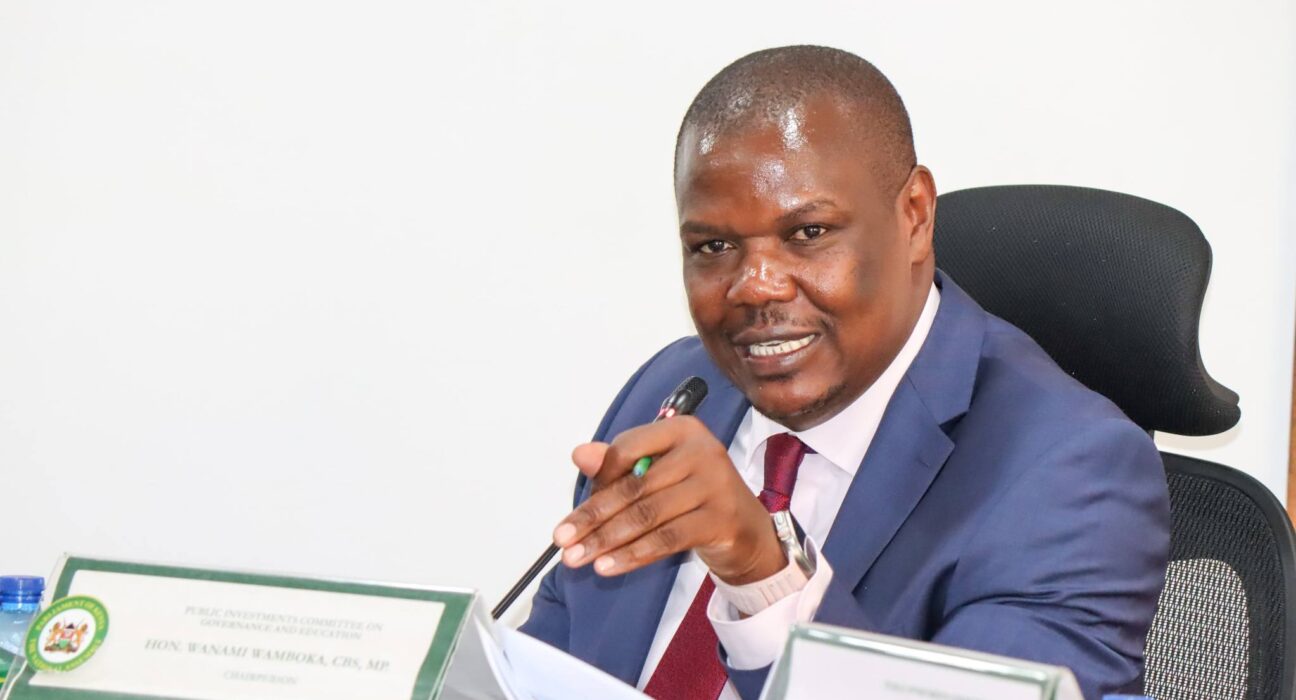Kenya’s higher learning sector is under intensified scrutiny as the Parliamentary Public Investments Committee on Governance and Education conducted a series of hearings to assess financial management and institutional governance. Chaired by Hon. Wanami Wamboka (Bumula), the Committee engaged universities, technical institutions, and regulatory bodies to reinforce accountability and protect public resources while ensuring quality education for Kenyan students.
The day-long engagements highlighted both persistent systemic challenges and opportunities for reform, spanning mismanagement of funds, inadequate staffing, unqualified personnel, and underperforming income-generating ventures.
Kenya Private Security Regulatory Authority Faces Staffing Scrutiny
The morning session began with the Committee questioning the Kenya Private Security Regulatory Authority over its stalled staffing plan. Legislators expressed concern over commitments made by the Director-General that depended on approvals outside his direct control, urging a review of internal human resource planning to prevent future delays.
“Institutions must take responsibility for their staffing processes rather than rely on external approvals,” said Hon. Wamboka, emphasizing the need for proactive leadership.
Pwani University Under the Spotlight
Members then visited Pwani University, where significant governance gaps were identified. The absence of a Chancellor was noted as a critical leadership vacuum, compounding ongoing operational challenges. Legislators questioned procurement procedures, misclassified payments, and a KSh 29 million expenditure that lacked proper documentation.
The Committee directed the Auditor-General to verify the financial trail and assess whether approvals were appropriately obtained, highlighting concerns over transparency and adherence to statutory regulations.
“Proper checks and balances must be in place to ensure every shilling of public money is accounted for,” Hon. Wamboka noted.
Kiambu National Polytechnic Fund Management Issues
The Committee also reviewed Kiambu National Polytechnic’s handling of KSh 2.8 million held in an institutional account over an extended period. Legislators requested the Ministry of Education to respond on how the funds were utilized. While concerns persisted, members acknowledged that the Polytechnic had made progress in addressing prior audit queries, signaling gradual improvement in governance practices.
Samburu Technical and Vocational College’s Revenue Challenges
During the afternoon session, Samburu Technical and Vocational College faced scrutiny for generating just KSh 76,000 in revenue over the past year. Lawmakers pressed the management to explore realistic and sustainable income-generating ventures, including livestock keeping and farming, emphasizing the need to diversify beyond government capitation.
“Institutions cannot rely solely on government funds; they must innovate to secure alternative revenue streams,” said Hon. Wamboka.
Moi Teachers Training College and University Governance Concerns
At Moi Teachers Training College, the Committee identified serious governance gaps, declaring the Finance Officer unfit to hold office due to a lack of professional qualifications and non-membership in the Institute of Certified Public Accountants of Kenya (ICPAK). The former Principal has also been summoned to address outstanding audit issues.
At Moi University, the Committee found additional weaknesses in financial management. The Head of Finance was deemed incompetent for failing to submit documentation on unaccounted legal fees to the Auditor-General. Furthermore, the former Vice-Chancellor will be required to explain why staff retirement benefits went unremitted during his tenure.
“We are committed to creating solutions that protect pensioners and uphold accountability across all public institutions,” Hon. Wamboka stated.
The Committee plans to summon the last three Vice-Chancellors to gain a comprehensive understanding of institutional decline and guide continuity measures. Despite these challenges, Members recognized the current Vice-Chancellor’s achievements, including increased student enrollment and reclaiming university land that had been irregularly leased. Legislators encouraged the leadership to consolidate reforms through strong governance and institutional resilience.
Committee’s Broader Mandate and Policy Implications
The day’s hearings reflect a broader effort by the Parliamentary Committee to ensure that public universities and technical institutions operate efficiently and transparently. Public institutions are funded largely through taxpayers’ money, capitation grants, and tuition fees; mismanagement of these resources can have a direct impact on students, staff, and the broader education ecosystem.
By examining compliance with procurement laws, audit reports, and internal governance structures, the Committee aims to safeguard public funds and ensure that educational institutions provide high-quality services to students.
Experts note that governance challenges in Kenya’s higher education sector are multifaceted. Institutions often struggle with unqualified personnel, delayed payments, underutilized funds, and low income diversification. These systemic issues can hinder student learning outcomes and compromise the long-term sustainability of public universities and technical colleges.
“Strengthening accountability in higher education is not just about compliance; it is about creating a culture of good governance that prioritizes students’ welfare and public interest,” said an independent higher education analyst.
Looking Forward: Building Stronger Institutions
The Committee’s interventions aim to drive institutional reform and capacity building. Summoning former Vice-Chancellors, Finance Officers, and Principals for explanations underscores a commitment to transparency and accountability. Legislators stressed the importance of proactive leadership and professional competence as prerequisites for effective financial and operational management.
While gaps remain, Members acknowledged initiatives by current leaders to restore institutional integrity, increase enrollment, and optimize asset management. Such measures are critical in boosting public confidence and ensuring that Kenya’s higher education sector delivers quality education to students nationwide.
“This Committee will always ensure that public institutions are well-managed and remain accountable because Kenyan students, workers, and taxpayers deserve nothing less,” Hon. Wamboka concluded.
The Public Investments Committee’s interventions in Kenya’s higher education institutions highlight a critical intersection of governance, accountability, and operational efficiency. By targeting financial mismanagement, leadership gaps, and revenue challenges, the Committee is setting a precedent for proactive oversight and systemic reform. As institutions respond to these findings, the broader goal remains to protect public resources while fostering an environment of sustainable, quality education across Kenya.





